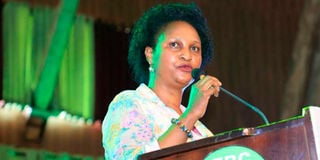Money-minting venture: Political party bonanza as 38 more seek registration

Registrar of Political Parties Anne Nderitu. Political Parties Act stipulates how billions should be shared, based on votes a political party got.
What you need to know:
- Upsurge in registrations of new political parties ahead of 2027 polls has lifted the lid on how running of the outfits a money-minting venture
- Political Parties Act stipulates how billions should be shared, based on votes a political party got
- In the latest disbursement, the top three took the lion’s share of party funding
An upsurge in registrations of new political parties ahead of 2027 polls has lifted the lid on how billions of shillings from the Exchequer have made running of the outfits a money-minting venture.
The rush to register new political outfits also points at growing political jitters and fears linked to party primaries in major formations where politicians at times end up being shortchanged and denied party ticket.
It also comes in the wake of a push by President William Ruto to have the 13 Kenya Kwanza Alliance partner parties fold and join his United Democratic Alliance (UDA) as the behemoth for his re-election.
Documents by the Office of Registrar of Political Parties (ORPP) indicate that 38 new parties are seeking registration amid revelation on how the outfits received billions of shillings from the Political Parties Fund these past 10 years.
Another 23 new parties have since obtained provisional registration, making it 90 newly registered parties. The country could have 151 political parties in the next General Election.
The 38 new outfits, whose names have since been approved by Registrar of Parties Anne Nderitu, include Solidarity Africa Alliance (SAA), Independent Patriots for Change (IPC), Taifa Democratic Coalition (TDC), Kenya Ahadi Party (KAP), Centrists for Economic and Social Reforms Party (CESRP), Liberal Economic Affirmative Party (LEAP) and the Inclusive Party (TIP TIP).
Others are National Harmony Party of Kenya (NHPK), Economic Liberation Alliance Party (ELAP), National Transformation Party (NTP), Ustawi Party of Kenya (UPK), Hope Party of Kenya (HPK), Justice Direction Party (JDP), Imarisha Uchumi Party (IUP) and Social Democratic Party of Kenya (SDP).
The documents also reveal how parties led by President Ruto, retired President Uhuru and opposition leader Raila Odinga have been the major beneficiaries of the Political Parties Fund in the past 10 years.
Accountability issue
Former MP Hassan Osman through Hassan N. Lakicha and Company Advocates has since moved to the High Court seeking to compel the Auditor General Nancy Gathungu to provide audited accounts of all political parties that have benefitted from the fund fwithin that period.
The decision by Mr Osman to move to court comes after the Office of the Auditor General failed to provide the information on how the beneficiaries spent billions from the Exchequer.
In the latest disbursement, President Ruto’s UDA received Sh577 million followed by Mr Odinga’s ODM which received Sh308 million. A total of 48 outfits benefited from the last disbursement from the Political Parties Fund.
In the 2020/21 fiscal year, Jubilee received Sh551 million while ODM got Sh430 million.
In the previous year, Jubilee received Sh564 million with Mr Odinga’s ODM getting Sh263 million while in 2018/2019, Jubilee and ODM received Sh435 million and Sh202 million, respectively.
In 2017/18, Jubilee received Sh240 million while ODM received Sh112 million.
But dozens of parties that have never benefited from the billions of shillings disbursed by the Exchequer have for the first time started to receive the cash to finance their activities following the enactment of the Political Parties Act of 2022.
The Act provides that for a political party to benefit from the Political Parties Fund, it must have at least an elected representative, a two-third gender principle complaint composition of office bearers and representation of special interest groups in its governing body.
The Political Parties Act provides that 70 per cent of the money be distributed proportionately, based on the total number of votes secured by a political party in the preceding election.





